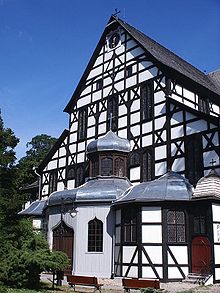Churches of Peace
| Churches of Peace in Jawor and Świdnica | |
|---|---|
| Name as inscribed on the World Heritage List | |

Świdnica/Schweidnitz
|
|
| Type | Cultural |
| Criteria | iii, iv, vi |
| Reference | 1054 |
| UNESCO region | Europe and North America |
| Coordinates | 51°03′14″N 16°11′46″E / 51.054°N 16.196°ECoordinates: 51°03′14″N 16°11′46″E / 51.054°N 16.196°E |
| Inscription history | |
| Inscription | 2001 (25th Session) |
The Churches of Peace (Polish: Kościoły Pokoju, German: Friedenskirchen) in Jawor (German: Jauer) and Świdnica (German: Schweidnitz) in Silesia were named after the Peace of Westphalia of 1648.
It permitted the Lutherans in the Roman Catholic parts of Silesia to build three churches from wood, loam and straw outside the city walls, without steeples and church bells. The construction time was limited to one year.
Since 2001, the two remaining churches are listed as UNESCO World Heritage Sites.
Despite the physical and political constraints, three of the churches became the biggest timber-framed religious buildings in Europe due to pioneering constructional and architectural solutions.
The church in Jawor, under the invocation of the Holy Ghost is 43.5-metre (143 ft) long, 14-metre (46 ft) wide and 15.7-metre (52 ft) high and has capacity of 5,500. It was constructed by architect Albrecht von Saebisch (1610–1688) from Wroclaw (then German Breslau) and was finished a year later in 1655. The 200 paintings inside by were done by Georg Flegel in 1671–1681. The altar, by Martin Schneider, dates to 1672, the original organ of J. Hoferichter from Legnica (then German Liegnitz) of 1664 was replaced in 1855–1856 by Adolf Alexander Lummert.
By that time, the town had been part of the majority Protestant Kingdom of Prussia for about a century. Another 100 years later, in 1945, the town became part of Poland, as a result of the Potsdam Agreement.
...
Wikipedia

